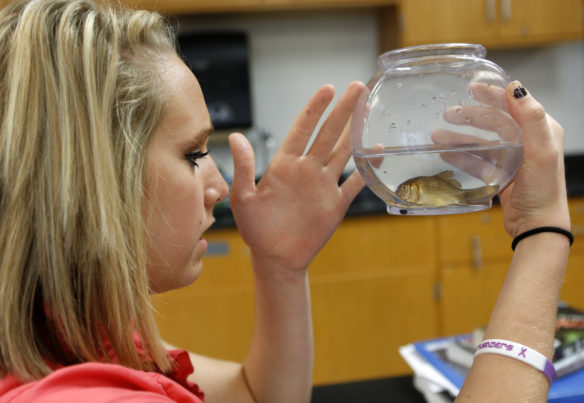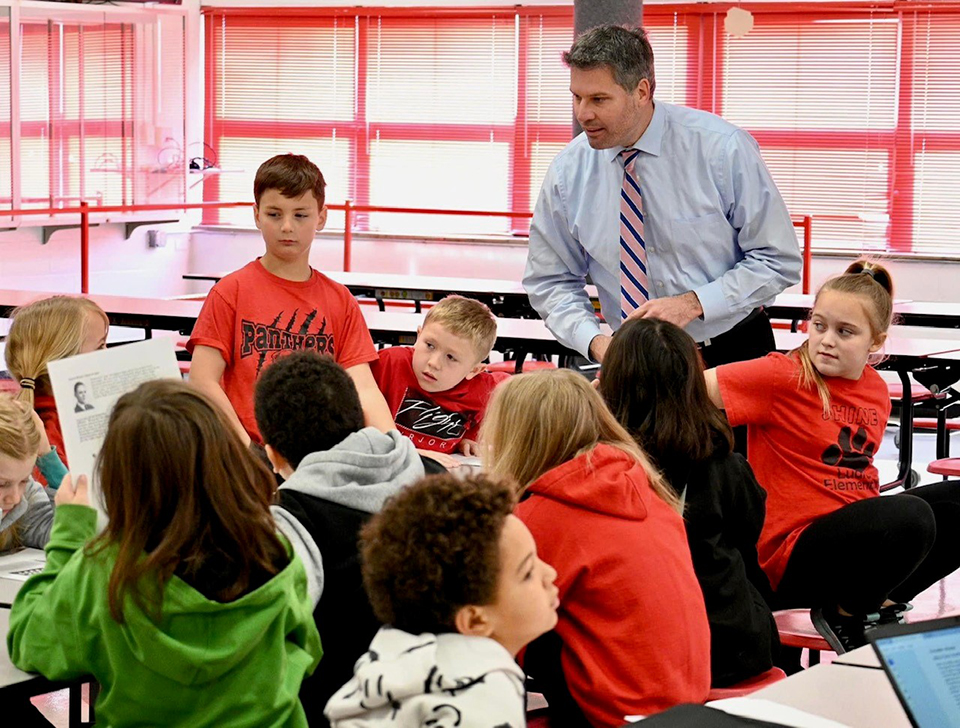
Sophomore Amanda Nelson examines her fish during an experiment learning about how body systems interact with each other during Tricia Shelton’s anatomy class at Boone County High School. The new Kentucky Science Assessment System will will use three components to measure students’ understanding of science.
Photo by Amy Wallot, Sept. 17, 2014
By Mike Marsee
michael.marsee@education.ky.gov
Simply preparing students to pass a test won’t pass muster in the new science assessment system.
With the adoption of Kentucky’s new science standards in 2013 came the need for a new assessment system that can more accurately judge whether students are learning them.
That system, which is undergoing field testing, contains components that will measure students’ understanding every step of the way.
Karen Kidwell, director of the Kentucky Department of Education’s (KDE) Division of Program Standards, said such measurements will be critical as schools change their approach to science education with the continued implementation of the Kentucky Academic Standards for Science. She said the foundation of the Kentucky Science Assessment System is rooted in a report from The National Academies of Science, Engineering and Medicine’s Board on Testing and Assessment, which concluded that a summative test alone could not properly assess whether students have learned the standards. She said what happens in the classroom on a day-to-day basis is the essential part of where learning occurs and the indicator of whether students are learning the skills spelled out in the standards.
“With these kinds of standards, there’s no way you can have just a single summative component and think that you’re getting enough information about student learning,” Kidwell said.
Kentucky’s system will include other components that Kidwell said are no less important, including:
- Classroom-embedded assessments, the day-to-day assessments that will be done within classrooms and schools and that are the first line of defense to keep students from falling behind.
- Through-course tasks that will provide a way for students to demonstrate science skills and concepts, as well as promote collaboration among teams of teachers who will discuss their students’ work and their own instructional practices.
- Summative tests that will ask students to apply what they have learned and will also be useful in reviewing what our schools are teaching.
“These first two components are going to be even more beneficial to changing the outcome that a school ultimately wants to get on the summative,” Kidwell said. “Those are the places where they can get real-time information and make the course corrections they need while there’s time and while those students are sitting in front of them.”
Sean Elkins, a KDE science consultant, said the summative component was piloted last spring with 26 7th-grade teachers and about 1,300 students across the state.
More than 40 teachers spent part of last summer working with KDE staff members to further develop the system, including developing models that will be used for the through-course tasks and working on the summative tests.
Kidwell said the system is a good one, but it will be even better as it improves along what Kentucky Education Commission Stephen Pruitt calls a “sliding scale of quality.”

Students’ understanding of the Kentucky Academic Standards for Science will be measured by the Kentucky Science Assessment System, which is being field-tested this winter.
Photo by Amy Wallot, Oct. 21, 2008
“This is an iterative process where we know that we all will continue to learn more and get better with all of these components of the system,” she said. “So while we think we have some excellent examples and models that we’ll be leading with this year, we also recognize that they’re not all the platinum standard. They will continue to get stronger as everybody in our system gets better.”
One area in which the system figures to get better is with the development of a “library” of through-course tasks for each grade level. Grade-level tasks have been created for the field test, which began this month and continues through March, and the library will grow as teachers develop and refine tasks.
Through-course tasks are a vital part of the assessment process and are to be carried out in a three-step process:
- Teams of teachers will study a task and develop an understanding of what they should expect from their students.
- Each teacher will facilitate the task with students.
- The teacher teams will reconvene to analyze evidence of student learning.
“We are not going to be checking every classroom to see that every single teacher is doing the through-course tasks, because it’s a formative piece. But the nature of this system is such that if they’re not taking advantage of the opportunity to see rich, three-dimensional tasks, to facilitate them with their students and to engage with their peers in the process, their students are not going to do well on the summative test,” Kidwell said.
Elkins said creating a practice summative-like test rather than teaching the through-course tasks will be virtually impossible because it would be too time-consuming.
“You can’t build a practice test to emulate the summative, because it’s just too hard,” he said. “I think once people realize that the complexity of the summative is too great, then they’ll see that the through-course tasks give me information on what I need to do to get my students ready, as opposed to a practice test.
“We want to move away from the practice test mentality.”
Kidwell said it’s important that schools understand that science assessment must go beyond the tests that have been given at the 4th-grade, 7th-grade and high school levels in the past.
“The standards are a 13-year progression of learning toward producing scientifically literate Kentucky students,” she said. “If you aren’t teaching science in 10 of those years, how could you possibly get to where you want to be?”
Other states are keeping an eye on Kentucky. Kidwell said many of them are still a couple of years away from even approaching a science assessment system, and they’ll be watching to see how Kentucky’s system works.
“They’re not being as aspirational as we are about what we can do,” Kidwell said. “A lot of them are waiting to see what Kentucky will do, because I think they’ll view that as kind of the gold standard. And Commissioner Pruitt has said, ‘We will have the best system for science assessment in the nation.’”
MORE INFO …
Karen Kidwell karen.kidwell@education.ky.gov
Sean Elkins sean.elkins@education.ky.gov



Leave A Comment